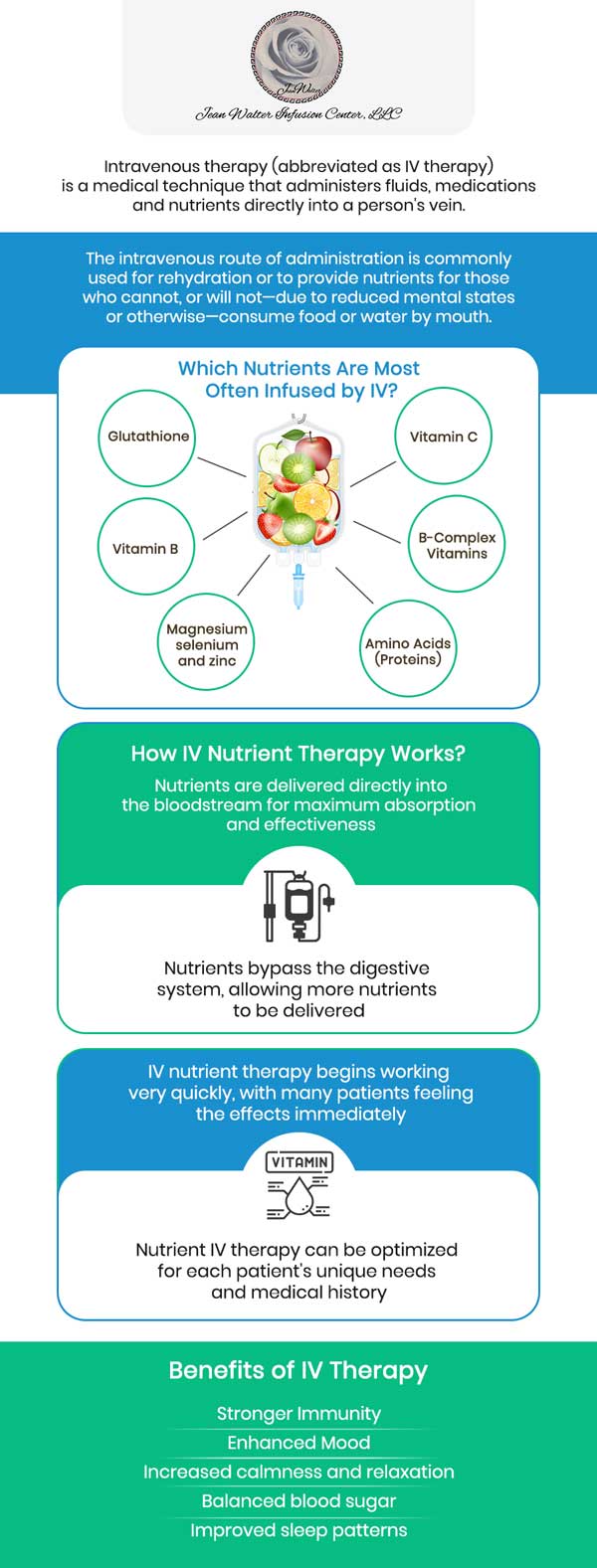What to Expect During Your Infusion Therapy Session in North Baltimore, MD
Infusion therapy is a crucial medical technique that offers numerous benefits for patients with various medical conditions. It provides a safe and effective method to deliver medications and fluids, ultimately improving patient outcomes and quality of life. Dr. Nasseri, MD offers this therapy to treat a wide range of conditions, from acute infections to chronic diseases. For more information, contact us or book an appointment online. We are conveniently located at 3333 N. Calvert St, Suite 540A, Baltimore, MD 21218.


Table of Contents:
What happens during an infusion therapy session?
Do I need to prepare for my infusion therapy session?
What are the signs that I should call my healthcare provider after an infusion session?
How Dr. Nasser Nasseri, MD Makes Your Infusion Therapy Session Comfortable and Effective
At the Jean Walter Infusion Center, patient safety and comfort are top priorities. Each infusion therapy session is meticulously coordinated to ensure effective treatment.
Patient Arrival and Preparation:
• The session begins with a review of medical history and current treatment plans to confirm therapy specifics.
• Patients are seated in private, comfortable reclining chairs for their infusion.
Infusion Process:
• A sterile catheter or needle is inserted into a vein, typically in the arm or hand, and connected to an IV line.
• The IV line is flushed with saline to ensure clarity and functionality.
• Medications or fluids, such as antibiotics, chemotherapy, hydration solutions, or biologics, are prepared and delivered via advanced pumps or gravity systems over a few hours.
Monitoring and Safety:
• Staff monitor for adverse reactions, such as nausea or headaches, and routinely check vital signs (blood pressure, heart rate, temperature).
• Nurses are always available to address concerns during the session.
Post-Infusion Care:
• After the infusion, the IV line is flushed, the catheter is removed, and a small bandage is applied.
• Patients receive post-infusion care instructions and recommendations for rest.
• Follow-up appointments or additional treatments are discussed as needed.
Infusion therapy at Jean Walter Infusion Center is a safe, precise, and comfortable treatment option for conditions such as cancer, autoimmune disorders, and infections. The center strives to provide a stress-free and supportive experience.
To ensure your session is smooth and effective, please follow this comprehensive preparation guide:
Follow Healthcare Provider Instructions:
• It is crucial to adhere to any specific guidelines provided by your healthcare provider regarding dietary restrictions before your appointment. Some therapies may require fasting, while others may not. Please clarify any uncertainties with our team ahead of time to ensure optimal treatment outcomes.
Clothing and Comfort:
• We recommend wearing comfortable, loose-fitting clothing to allow easy access to your infusion site, whether it’s an arm or another area. Our center can be cool, and the therapy might affect your body temperature, so please bring a sweater or blanket for added warmth.
Hydration:
• Staying hydrated is important. Drink plenty of water before your session unless advised otherwise by your healthcare provider. This helps make your veins more accessible, facilitating a smoother infusion process. Avoid beverages like caffeine or alcohol, which can affect your fluid balance.
Medications and Allergies:
• Bring a comprehensive list of your current medications, including any over-the-counter drugs and supplements, along with details of any allergies. This information helps us prevent any adverse reactions. Please inform us about any medical conditions or previous infusion experiences you may have had, as well as any allergies to materials like latex or iodine.
Eating:
• Eating a light meal or snack before your session can help prevent nausea or lightheadedness. However, avoid heavy or fatty meals that might interfere with the absorption of the medication.
Infusion Site:
• Choose an infusion site that is easily accessible and free from complications. Let our medical team know about any skin sensitivities, especially related to the tape or adhesives used for securing the IV cannula.
Additional Considerations:
• Don’t forget to bring the necessary documents, such as insurance cards or medical records. If you have any concerns or questions, please reach out to our healthcare team for clarification and guidance.
By following these preparation guidelines, you can help ensure your infusion therapy session at Jean Walter Infusion Center is as comfortable and effective as possible.
After your infusion session, it’s essential to be vigilant about how your body responds. Please contact us or seek medical attention if you notice any of the following symptoms:
• Severe Allergic Reaction: Be alert for symptoms such as hives, swelling of the face, lips, tongue, or throat, difficulty breathing, dizziness, or fainting. These could signal an allergic reaction to the medication or solution administered during your infusion.
• Fever or Chills: A temperature exceeding 101 degrees Fahrenheit or persistent chills and shivering might indicate an infection or an adverse reaction.
• Pain or Swelling at the Infusion Site: Watch for redness, warmth, tenderness, or ongoing pain at the infusion site, as these may suggest an infection or issues related to needle placement.
• Headache or Dizziness: If you experience severe or persistent headaches, especially if they are accompanied by nausea or vomiting, please let us know.
• Nausea or Vomiting: Frequent or severe nausea, particularly if accompanied by diarrhea, should be reported to your healthcare provider.
• Shortness of Breath: Any difficulty breathing or a sensation of shortness of air requires immediate attention.
• Chest Pain or Tightness: Any form of chest discomfort, such as aching, pressure, or tightness, should be addressed promptly.
• Confusion or Disorientation: If you experience confusion, difficulty thinking clearly, or dizziness, please contact us immediately.
• Changes in Vision: Be aware of symptoms like blurred or double vision and increased sensitivity to light.
• Any Other Concerning Symptoms: If you encounter any unusual or unexpected symptoms that persist or worsen, don’t hesitate to reach out.
Dr. Nasser Nasseri, MD, and his team at Jean Walter Infusion Center are dedicated to making your infusion therapy session a comfortable and effective experience. From the moment you arrive, Dr. Nasseri’s approach ensures that you receive personalized care that caters to your individual needs, making the process as smooth and stress-free as possible.
Before each session, Dr. Nasseri takes the time to thoroughly review your medical history, symptoms, and treatment goals. This allows for a tailored approach to your infusion therapy, ensuring the right medications and infusion schedule are selected for optimal results. During the session, you can relax in a comfortable, welcoming environment, while Dr. Nasseri and his skilled staff monitor your vital signs and overall well-being. The infusion process is carefully controlled, and adjustments are made when needed to ensure your comfort.
With Dr. Nasseri’s expertise, your therapy session is not only focused on treatment but also on providing a positive experience, from minimizing discomfort to addressing any concerns you may have. After the session, you’ll receive detailed aftercare instructions and be guided on follow-up appointments to track your progress and maintain the benefits of the therapy.
Whether you’re receiving therapy for immune disorders, chronic conditions, or general wellness, Dr. Nasseri and his team prioritize your comfort, safety, and treatment success every step of the way. For more information, contact us or book an appointment online. We are conveniently located at 3333 N. Calvert St, Suite 540A, Baltimore, MD 21218. We serve patients from North Baltimore MD, Dundalk MD, Halethrope MD, Ferndale MD, Yorktown MD, and surrounding areas.
Check Out Our 5 Star Reviews

Additional Services We Offer


- Infusion Therapy
- Injection Treatments
- Intravenous Immunoglobulin Therapy
- Medical Conditions
- Asthma
- Crohn’s Disease
- Fibromyalgia
- Gout
- Inflammatory Eye Disease
- Inflammatory Skin Disease
- Iron Deficiency
- Lupus
- Multiple Sclerosis
- Myositis
- Osteoporosis
- Rheumatoid Arthritis
- Ulcerative Colitis
- Vasculitis
- PRP Injections






